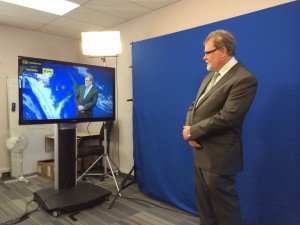
The president of the World Meteorological Organization, Dr David Grimes, and over 30 international experts on polar weather and climate are in New Zealand for a week-long meeting of the WMO’s specialist polar advisory panel.
The World Meteorological Organization (WMO) is a specialized agency of the United Nations. It is the UN system’s authoritative voice on the state and behaviour of the Earth’s atmosphere, its interaction with the oceans, the climate it produces and the resulting distribution of water resources.
The Science Media Centre’s Dacia Herbulock sat down with Dr Grimes during his recent visit to MetService in Wellington to talk about extreme weather events, climate change adaptation and priorities for Antarctic climate research.
NB: Science reporter William Ray, Radio New Zealand News, can also be heard asking questions on the recording.
Excerpts from the Q&A with Dr David Grimes:
“One of the key priorities that is being developed under the World Meteorological Organisation is focused on both climate and weather resilience, looking at how we build structures to withstand significant wind and storms, heavy precipitation events. …
“What we do is put in programmes that help abate the consequences of significant events. People are experiencing climate change, experiencing more extreme events. … We have spent the last couple of years developing an implementation plan that looks at building capability around the world for countries that really don’t have any kind of climate service. Our expectation is that by 2019 we would have all countries in the world having at least a basic climate service, understanding the consequences of climate on their programmes. In short, it’s about adaptation to these extreme events, and how we prepare societies with the basic scientific information that they need in order to be prepared.”
“It’s implicated everywhere. You could probably look at every country, New Zealand included, and find gaps in this area. Have they built their infrastructure in a way that would be resilient to sea level rise, for example. This is of particular concern as we look at what’s happening with respect to the ice caps. We monitor, through our cooperation with the satellite agencies throughout the world, things such as the altimetry of the ocean, which tells us something about sea level rise. We now understand with that kind of science that it’s not uniform — it’s not like filling up a glass of water. In certain parts of the world [sea level rise] is higher than in other parts of the world. It’s a consequence of subsidence — land may be falling or rising — but it’s also a consequence of the actual temperature of the ocean and its warming.”
“What’s going on in the polar regions is having global consequences. It affects the climate and the weather patterns no matter where you live. The Earth is a system that is very much closed and integrated together, so as we start to see shifts and significant changes in the polar regions … they have consequences on weather, climate and water, the availability of water resources around the world.”
“Antarctica is very sparsely monitored. In terms of the stations we have, for the size of Antarctica, we don’t have many. Also it’s a very harsh environment, very hard to go down to repair or restore these kinds of stations. So the interaction between remote sensing — sensing from space — and how that relates to surface observations is a key research priority. The dynamic of ice sheets is quite critical, trying to understand the behaviour of ice sheets that extend over open water. … One of the areas we are looking at is how we can better increase our skill at making predictions in the Antarctic region, even seasonal forecasts. Part of that challenged by not having a complete awareness of the full climatology of the region because we don’t have enough monitoring sites.”
“Is there one forecast? Probably not. Australia looks after its own interests. The United States look after their own interests. Argentina, Chile, they each provide their basic services. So one of our objectives is to build better coordination among these groups. That’s one of the topics we’ve been discussing this week.”
“The WMO initiates Regional meteorological centres, which are specialised forecasting centres. New Zealand provides marine forecasting in this context — they have responsibility for the open ocean, what we call a high seas forecast. … So that’s an international responsibility that they have. Another good example is volcanic ash. … One of the topics this week is, could we move in a direction where that could happen [in Antarctica]. Particularly important as we think of the climate element. That’s where I think we’ll make some progress, because different countries have different capabilities and this could be very helpful for a more coordinated effort. … And I think the community thinks we can find a way forward.”